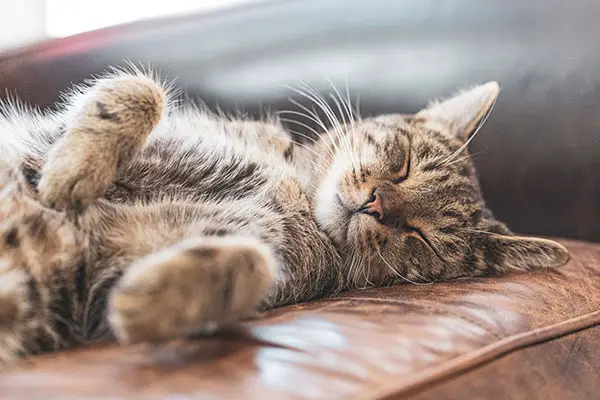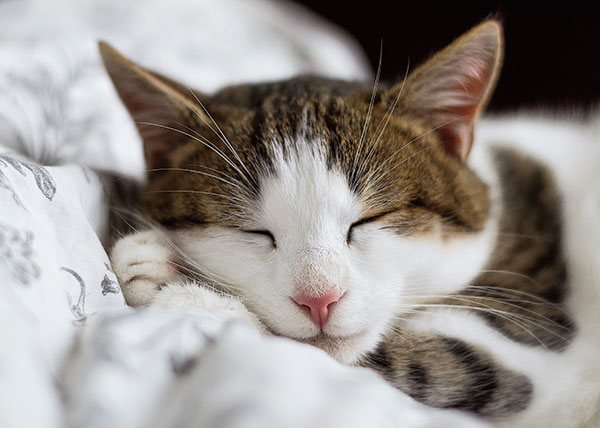You’re snuggled down on your couch catching up on your favorite Netflix program when suddenly, your cat comes and lies beside you, seemingly also eager to watch the show.
After a couple of minutes, the cat doses off and starts to snore. You’ve probably heard your feline friend snoring a million times, so this seems to be a pretty normal kitty behavior.
But as the animal drifts deeper into sleep, you start to see him twitching, pawing in the air, and even chattering. It almost seems as if he’s about to have a seizure attack.
Any pet parent in this situation would pause and wonder, is my cat dreaming?
Well, the answer is a resounding yes. Cats, like humans and many other animals, do dream. And there’s a range of things that can fill their dreams.
This brings us back to our main question, do cats dream about their owners?
Again, the answer is yes. Cats can dream about a number of events that take place during their waking hours. These events typically include their experiences with other cats, their human owners, their toys, etc.
In fact, cats may also experience nightmares. This is more common among cats with post-traumatic stress disorder (PTSD), such as those that were rescued from abusive owners. Some cats might even dream about people, things, or events that are completely wild and unrelated to their daily experiences.
Read on for more insights into what cats dream about. Hopefully, by the end of the article, you’ll know whether you usually have a place in your cat’s dreams.
Table of Contents
What Do Cats Dream About?
One way to know whether your cat dreams about you is to begin by understanding what cats dream about in general. As we’ve already pointed out, there’s a wide range of people, things, and events that can fill a cat’s dreams.
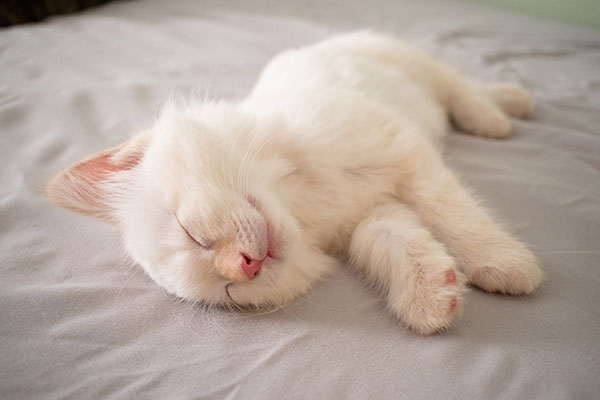
A 1960 study conducted by sleep researcher Michel Jouvet revealed that hunting-like behavior occupies the dreams of most cats.
Michel Jouvet observed that while sleeping, most cats hissed and arched their backs into a typical hunting posture. As a result, Jouvet inferred that cats probably mainly dream about their hunting escapades.
These escapades range from play hunting antics that normally involve sibling cats to serious hunting quests that usually involve cats and other animals, such as rodents.
But hunting isn’t the only thing that cats dream about. Cats also do dream about food. Such dreams are often marked by actions like licking of the mouth.
Depending on how intense the dream is, a cat may even appear to chew in their sleep. This doesn’t necessarily imply that the animal is famished. On the contrary, he might just be dreaming about his last delicious meal before taking a nap. In case you’ve always wondered, ‘do cats dream about eating,’ it’s interesting to know that they do.
Another thing that cats generally dream about is their daily experiences with other cats. If you have multiple cats, then it’s only natural that your feline friend will dream about playing, grooming, fighting, or even mating with his fellow cats.
- Cat tower in Gray designed to engage indoor cats in climbing and scratching and cozy naptime
- 2 sturdy scratching posts, plush suspended hammock, secure base, and a replaceable dangling soft ball toy
- Natural jute fiber provides an optimal texture for cats to sharpen claws and keep nails healthy
Last update on 2024-07-20 / Affiliate links / Images from Amazon Product Advertising API
So, do cats dream about other cats?
Cats definitely dream about other cats. And there are numerous things they can dream about, including playing, fighting, mating, etc.
The following are other common things that cats dream about;
- Chasing their toys
- Enjoying their treats
- Scratching surfaces
- Pulling on curtains and strings
- Playing with or being groomed by their human families
Basically, anything that a cat does during his waking hours may come back to him in his dreams.
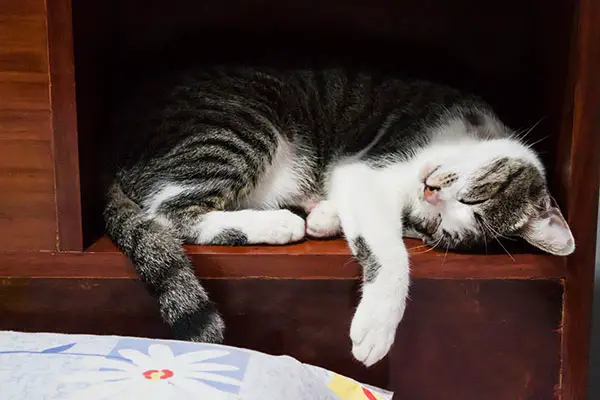
Also, as we did mention, cat dreams may not always be pleasant. Neither are they always based on their daily experiences.
Cats can also dream about events they’ve never experienced before. In their dreams, they could meet strange people, interact with unfamiliar cats, and even travel to a faraway land that only exists in their imaginations.
But Do Cats Really Dream About Their Human Owners
We’ve already mentioned that cats can dream about all manner of events and experiences that they go through during their waking hours.
Humans play such a significant role in the life of a domestic cat. We feed them, groom them, pet them, play with them, and even take care of their emotional needs. From a cat’s point of view, humans also occupy the highest position in the family pecking order.
So, it’s only understandable why humans are some of the top things that cats dream about.
As you may have guessed, how often a cat dreams about their human owners depends on the nature of the bond between the two. The closer you are to your kitto (physically and emotionally), the more likely he is to dream about you. And the dreams will often be fairly intense.
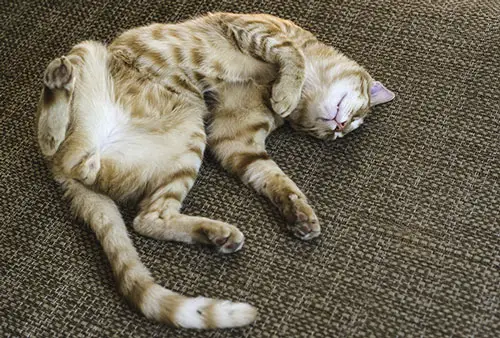
Do Cats Dream And Have Nightmares?
Like humans, cats can have nightmares.
Nightmares are common among rescue cats who may have been separated from their mothers when they were still fairly young. Note that veterinary officers discourage adopting kittens until they’re at least eight weeks old.
Traumatic past incidences may also trigger nightmares. For instance, cats rescued from abuse owners may dream about the traumatic experiences they went through in the hands of their previous cruel owners.
Last but not least, nightmares could result from certain frightening sights and sounds. Examples include lightning, thunderstorms, fireworks, or cars racing on the freeway.
How Do You Know If Your Cat Is Dreaming?
Now that it’s evident your cat dreams about you, you might also be wondering, what do cats do when they are dreaming?
Now, it’s important to understand the tell-tale signs that a cat is dreaming. That will help you to rule out all fears of seizure attacks.
The following are common signs that a cat is dreaming;
- Mouth movements
- Making tiny sounds, such as hissing, meowing, whimpering, snoring, or snorting
- Pawing in the air
- Twitching of the whiskers, legs, or tail
- Arching of the body or back
Do cats meow when they dream?
Yes. Meowing is one of the sounds a cat may make when asleep to indicate he’s dreaming.
It’s also worth noting that the various sounds and body movements a cat makes during sleep depend on four factors. They include the specific thing the cat is dreaming about, the intensity and vividness of those dreams, a cat’s age and lifestyle, and whether the animal is having normal dreams or nightmares.
Also, remember to not only watch out for the sounds and actions that happen during sleep but also what a cat does as soon as he wakes up. If a cat suddenly wakes up visibly anxious, it’s possible that he had a nightmare.
But as you shall find, most cats probably won’t remember what they dreamt about minutes after waking up.
- Cube-shaped cat house offers kitty a fun, relaxing place to lounge, hide, and play
- Suede side and bottom; cozy sherpa top with a soft suede raised-border edge for added structure and comfort
- Interior den-like hiding space for napping; circular cut-outs promote interactive play
Last update on 2024-07-20 / Affiliate links / Images from Amazon Product Advertising API
Do Cats Dream Like Humans?
To understand whether cats dream like humans, it’s important to familiarize yourself with a cat’s sleep cycle.
Cats, like humans, experience two main types of sleep – rapid eye movement (REM) sleep and non-rapid eye movement (non-REM) sleep.
As the name implies, rapid eye movement sleep refers to a stage during sleep that’s marked by random, repeated movements of the eyeballs within the sockets. Research suggests that much of the dreaming takes place during REM sleep.
Besides random movements of the eyeballs within the sockets, REM sleep is also characterized by heightened brain activity. Much of this activity mirrors that of an animal when awake.
Increased breathing and heart rate are other indications that an animal is in REM sleep.
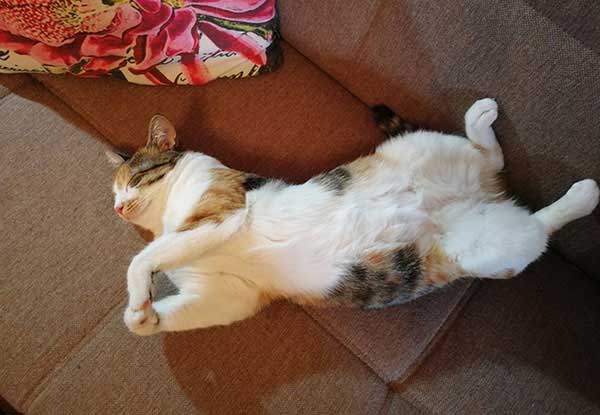
Some animals, particularly humans, might even act out their dreams. This phenomenon is known as sleepwalking or somnambulism. Sleepwalking shouldn’t be a problem if it happens once in a while.
However, frequent dramatization of dreams could be an indication of REM sleep behavior disorder, a severe sleep disorder that may throw an animal’s circadian rhythms off balance if it goes untreated.
Fortunately, the brains of most mammals (including cats) have developed an effective way of lowering the risks of sleepwalking and its associated complications. REM sleep induces certain changes in brain signaling.
These changes consequently reduce the muscle tone in many of the muscles around the body, a phenomenon known as muscle atonia or REM sleep muscle paralysis. The temporary muscle paralysis makes it difficult to dramatize dreams, which explains why you’ll probably never catch your cat sleepwalking.
Maybe you’ve always wondered, do cats sleepwalk?
As we’ve already mentioned, it’s almost impossible to ever find your cat sleepwalking. That’s mainly due to the temporary muscle paralysis that takes place during REM sleep.
But perhaps the most fascinating thing about REM sleep is how ironically this sleep phase manifests itself. With elevated brain activity, coupled with rapid eye movements, an animal in REM sleep may appear deceptively awake. On the contrary, many animals are usually in such a deep sleep that it may be difficult to wake them.
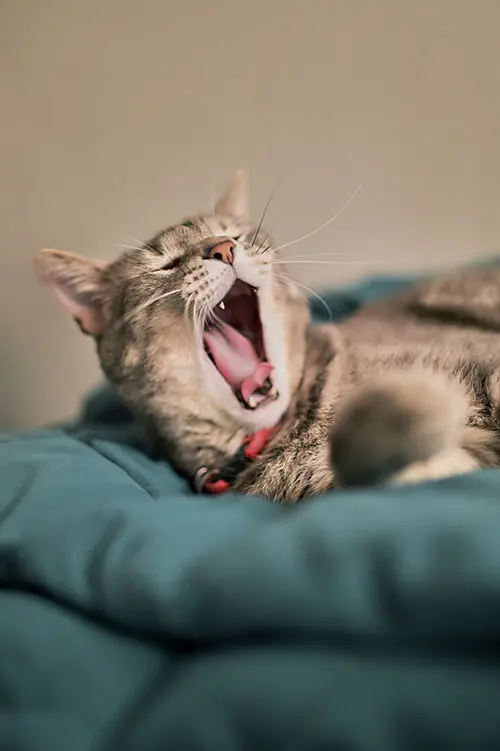
Also, note that the non-rapid eye movement (non-REM) sleep is an equally important sleep phase. Considered the deep sleep stage, non-REM sleep is the stage of sleep during which the body heals and repairs itself for the day ahead.
Some of the repair work that takes place during non-REM sleep includes recovery from microscopic damages to muscle tissues, which happen throughout a cat’s waking hours. These damages result from routine feline activities, such as playing.
So, do cats dream like humans?
Not only do cats have the same sleep cycle as humans. They also dream as we do.
The only difference between humans and cats, as far as sleep is concerned, is with regards to our circadian rhythms. Humans are generally diurnal – active during the day but sleeping at night. Cats, on the other hand, are crepuscular – active at dawn and dusk but sleeping during the day and at night.
- 【Enough Space】The size of 15*15*15 inches allows the kitten to have enough space to stretch inside. The arched design at the...
- 【HIGH QUALITY MATERIAL】The calm cat bed is made of durable material that is resistant to bite and scratches, the interior...
- 【Foldable Cat Bed】Comfortable cave cat tent, very convenient to carry and store, can be folded in seconds, very convenient for...
Last update on 2024-07-20 / Affiliate links / Images from Amazon Product Advertising API
What Do Cats Dream About When They Twitch
We’ve highlighted the role of muscle atonia in blocking intense muscle activity during sleep, ensuring that your cat doesn’t end up sleepwalking.
However, muscle atonia may not always work. That explains why you might still see your cat twitching his limbs, tail, or whiskers in his sleep.
Nonetheless, twitching is usually no cause for alarm. It’s merely a sign that your cat is dreaming, hopefully about you.
Do Cats Dream In Color?
Cats are generally not colorblind. They can clearly see blue and yellow.
So, it’s only natural that cats also dream in color.
In fact, you’re most likely to appear to your cat’s dream in your favorite outfit. That’s especially if you’re into blue and/or yellow colors.
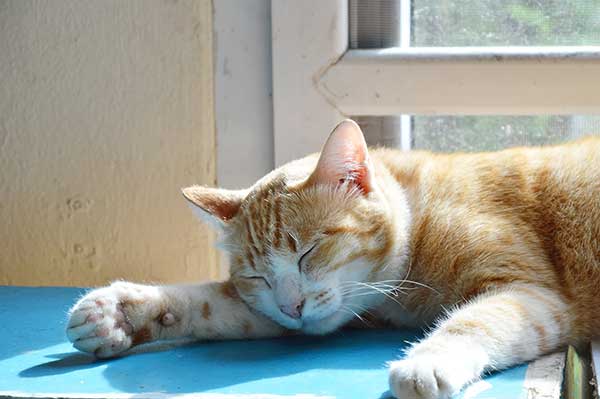
Do Cats Know They Dream?
When dreaming, it’s impossible to actually tell that you’re dreaming. That’s for the simple reason that you’re asleep and sleep is a temporary state of unconsciousness.
However, most humans can remember their dreams when they wake up. In fact, some dreams can be so vividly remembered years from the time they were experienced.
On the flip side, most cats won’t be able to recall their dreams minutes after waking up. Although a cat may suddenly wake up from a bad dream and appear visibly anxious, the animal won’t be able to tell just what’s getting him worked up.
Do Older Cats Dream More?
Kittens and younger cats are known to spend more time in REM sleep than their older counterparts.
Veterinarians believe that this has a lot to do with the animals’ need to process new information.
Based on that logic, it makes sense to infer that younger cats dream more than older ones.
But as you shall find, the situation isn’t as cut and dried as it may seem.
Note that cats also tend to sleep longer as they age, ostensibly to conserve energy. And the more they sleep, the more likely they are to dream. Which implies that sometimes, older cats may dream more than younger ones.
- CATS LOVE IT: A scratcher, play area, & SO MUCH MORE. Incl premium USA organic catnip leaf. Natural scratching = healthy claws,...
- YOU'LL LOVE IT: Made of recycled cardboard & corn starch glue. Attractive design, neutral colors. Recommended to save your...
- THOUGHTFUL DESIGN: Vertical based on your cat's preference or to compliment horizontal scratching; also features a cubby hole for...
Last update on 2024-07-20 / Affiliate links / Images from Amazon Product Advertising API
Do Cats Dream With Their Eyes Open?
Although cats can sleep up to two-thirds of their day, much of their sleeping time involves short naps.
During these naps, a cat is usually semi-awake and ready to pounce if provoked.
That explains why you might have spotted your cat sleeping with his eyes open.
Should You Wake A Dreaming Cat?
The adage “let sleeping dogs lie” probably rings more true for dogs than it does for cats, even though the phrase is hardly ever used in its literal sense.
All the same, is it a good idea to wake a dreaming cat or should you simply let him lie?
Experts discourage waking a sleeping cat.
First, doing so could disrupt the all-too-important process of muscle repair that happens during sleep.
Waking a dreaming cat could also startle the animal. If the cat feels threatened, he may scratch or bite.
What Do Indoor Cats Dream About?
An indoor cat is likely to dream about how he spends his time indoors.
Examples of indoor activities include cuddling with their owners, playing with their toys, or eating.
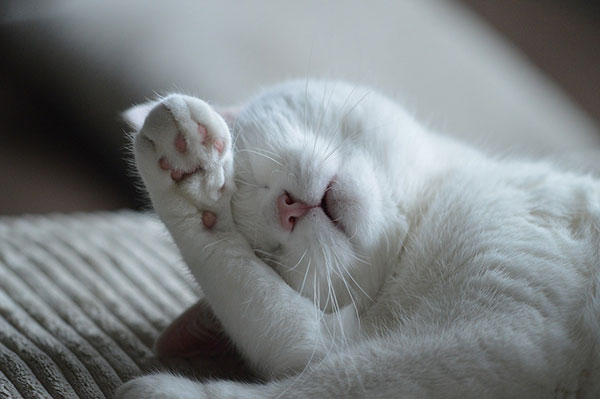
Conclusion
Cats typically dream about the things they experience during their waking hours, and their human owners are usually right at the center of those experiences.
So, if you ever saw your feline friend making sounds or movements in his sleep, the chances are that he’s dreaming about you.
Checkout Our Favorite Cat Products
1. Best Online Course For Cat Parents
Our favorite: The Cat Language Bible (How to Finally Understand And Speak to Your Cat) – A new form of cat to human communication that many cat owners have dreamed about… but few have actually thought possible.
2. Best Immune Support For Cats
Our favorite: Tomlyn Immune Support – Best Supplement for Cats and Kittens.
3. Best Cat Treats
Our favorites: LIFE ESSENTIALS All Natural Freeze Dried Chicken And Sheba Meaty Tender Sticks – Both are Great.

